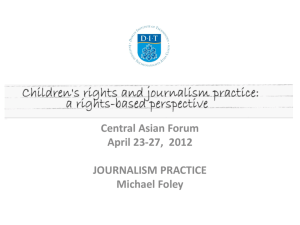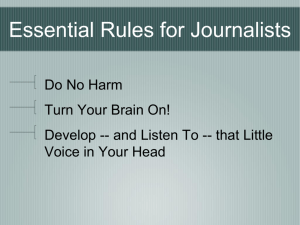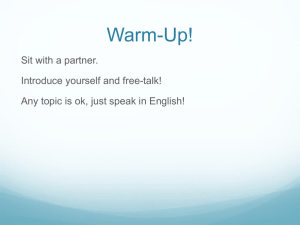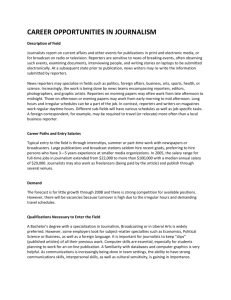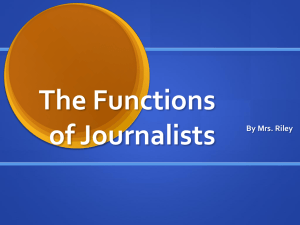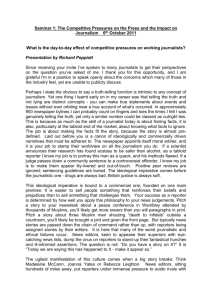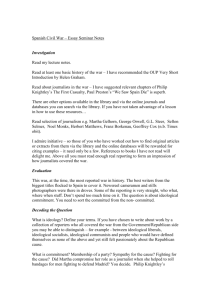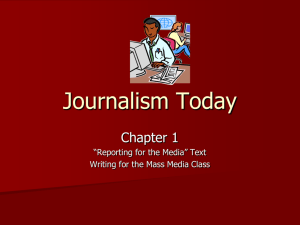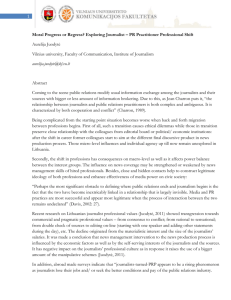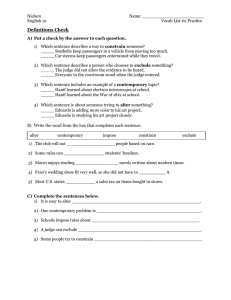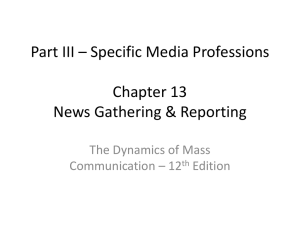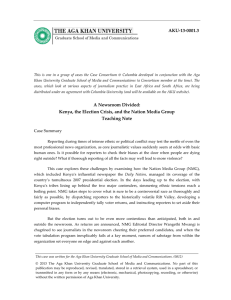Wiida Fourie presentation
advertisement
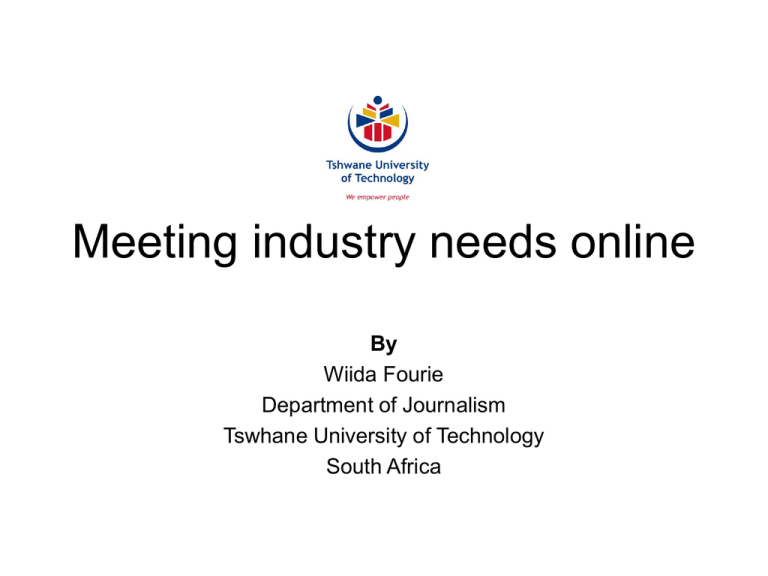
Meeting industry needs online By Wiida Fourie Department of Journalism Tswhane University of Technology South Africa Background • New democracy 1994. • Urgent transformation of the SA media: – Media ownership, – Staffing, and – Content. • Mistrust between media & government: – Unfair and unbalanced reporting; – Minor “irritations” (lack of accuracy). – Society in transformation. Background • 2000: SA Human Rights Commission’s Inquiry into Racism in the SA media. • 2001: Sun City Bosberaad. • Mthathu Tsedu, chairperson of Sanef: “We concede there’s too much shallowness, superficiality and unprofessionalism in the South African media….” • 2002: National Skills Audit of reporters with 25 years experience. National Skills Audit Problems in the newsroom: • poor reporting skills, • lack of concern with accuracy, • Poor writing skills, • Lack of life skills, eg computer literacy, • Low level of commitment, National Skills Audit Problems in the newsroom: • weak interviewing skills, • weak legal knowledge, • weak knowledge of ethics, • poor general, historical and contextual knowledge of journalists and • low level of trainer knowledge. Writing Skills • Rated as below average (38%): • Between 13% and 40% were found lacking the skills to utilise the basic news values in writing. • Between 8% and 35% or reporters failed to use titles correctly, and • Between 8% and 25% failed to report events correctly. Writing Skills • Between 32% and 41% of reporters were rated as only having average skills in writing paragraphs and sentences of functional length. • More than half of the reporters were found not to bring possible errors to the news editor’s attention. National Skills Audit • “…probably most of the present challenges facing the media [in SA] as far as news coverage is concerned, are to be found in reporters’ skills to properly perform the task at hand” (De Beer & Steyn 2002). SA National Editors’ Forum (Sanef) Education and Training Policy: • The purpose of education and training must be the improvement of journalism. • Ongoing training is the right of every journalist. • Training is a continuous process that should occur throughout the careers of journalists. Sanef’s Education and Training Policy: • Training should not be seen as only for junior journalists or as demeaning. • Media training does not just involve technical or skills training, but should incorporate social/ethical/political components and be holistic. • SA Government skills levy. Skills Programme in Basic Journalism • Started in 1997 to address the “untenable” skills shortage at community newspapers. • Have trained over 70 journalists. • Went ‘online’ in 2003. Skills Programme in Basic Journalism The professional journalist Specialist Reporting Writing Skills Specialist Skills Media Law and Ethics Basic English for Journalists Successes • • • • Weekly general knowledge quiz. Mentoring by senior journalists. Reading. Computer/internet skills…. Mentoring “Hi Noluthando First things first. It is very important that you use correct language in your emails. You know, people will not take you seriously as a writer if your emails are full of language mistakes. I will look at the article, but please fix up the mail below and send it again. I have highlighted the mistakes” (Fourie 9/12/03). Mentoring Hi Zonke Attached is your first report. You might get a fright when you see all the red marks, but actually the report is well written, and well structured. Congrats. One BIG mistake, however, there is no source! Where did you get the information? (Nelmapius 12/10/03). Mentoring Zonke I am losing my patience. This is a totally new article, with so many sloppy mistakes, it is obvious that you did not read through it before submitting it to me…. Do you expect me to go through the whole process again? I certainly don’t think you deserve it…. Get your act together. You are wasting my time (Nelmapius 38/01/04. Reading When Things Fall Apart by Chinua Achebe: “This book is about the people of Africa and how they were operating before the arrival of the missionaries. Before, a man was respected by his people when he was a hero and when the messionaties came to Africa they changed everything. .” Reading Nelson Mandela’s Long Walk to Freedom: This is an Autobiography of Nelson Mandela This book might look thick to anyone who comes across it, especially those who have no choice but to read and finish it.I promise that once you start reading it you won't be able to stop.It leads you right to the end. (Posted on bulletin board 15/08/2003). Problems • Initially students performed for the course, but not in the newsroom (Moult 2003). • Language skills still not on standard. • Next level?
